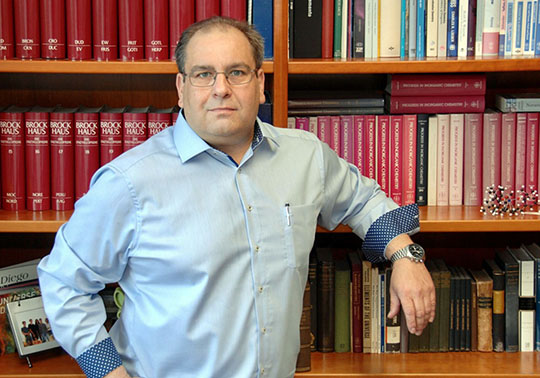Molecular materials for biomedicine, energy and electronics of the future, at the XVII ICMol Scientific Conference
- Fundació Parc Científic
- December 13rd, 2017

2D material for the next-generation electronic, sugars responsible for infectious processes, gold nanoparticles for biomedicine or the chemical uses of depleted uranium are some of the disparate topics covered by molecular research. All these topics will be addressed on 15 Friday at the XVII ICMol Scientific Conference of the Institute for Molecular Science (ICMol) of the Universitat de València. It is a dissemination scientific action that this centre of research excellence has been doing since its opening in 2000.
As every year, the Institute for Molecular Science of the Universitat de València hold the scientific conference with the participation of outstanding researchers and institutional representatives. The purpose of the conference consists, on the one hand, of balancing the status of both the discipline and the activity of the institute itself, a centre accredited as the Maria de Maeztu Excellence Unit, the highest scientific recognition that the Ministry of Economy, Industry and Competitiveness grants to entities dedicated to scientific research; and on the other hand, to open molecular science to all those branches of physics and chemistry that can contribute with their work to this multidisciplinary field of scientific research. It is, therefore, a molecular science high dissemination conference.
On this occasion, the ICMol has the participation of four leading scientists who will address, during the morning and in an informative manner, four cutting-edge research areas in the field of molecular science. Paolo Samorì, Catalan-Sabatier 2017 of the Royal Spanish Society of Chemistry (RSEQ) award-winning; Karsten Meyer, 2017 Elhuyar-Goldschmidt Prize of the RSEQ winner; Jesús Jiménez Barbero, Scientific Director of CIC bioGUNE and President of the RSEQ, and Luis M. Liz Marzán, Scientific Director of BiomaGUNE.
The conference, which as in each edition will open with the balance of results and the state of the institute, presented by the director of ICMol, Eugenio Coronado, will be inaugurated by the Principal of the Universitat de València, Esteban Morcillo, and the Vice-Principal of the Valencian Agency for Innovation, Andrés García Reche, in addition to Nazario Martín, President of the Confederation of Scientific Societies of Spain (COSCE); Jesús Jiménez, president of the RSEQ, and Coronado.
The Conference will take place on 15 Friday, from 9 a.m. to 2 a.m. in the assembly hall of the Researching Institutes (Parc Cientific of the Universitat de València) and it counts on the support of MINECO and the Valencian Government.
PAOLO SAMORÍ
Institut de Science et d’Ingénierie Supramoléculaires (ISIS). Université de Strasbourg & CNRS. 2017 Catalan-Sabatier French-Spanish award of RSEQ.
“When molecular science meets 2D materials: orchestrating multiple functions”.
Research in two-dimensional materials predicts a revolution in the world of electronics. The keys to the development of tiny and much more powerful devices are now brewing in chemistry and physics laboratories around the world. The molecular interactions study is one of the instruments dedicated to this purpose. Samorí will talk about how the molecular science contributes to improve 2D material characteristics for the development of the future electronic devices.
KARSTEN MEYER
Dept. of Chemistry and Pharmacy. University of Erlangen-Nürnberg (Germany). 2017 Spanish-German Elhuyar-Goldschmidt award of RSEQ.
“From radioactivity and nuclear fuels to CO2 activation and electrocatalytic H2 production reactive Uranium complexes – Chemistry between phobia and enthusiasm”.
Uranium, one of the heaviest and worst reputation natural elements, can be used to produce hydrogen –the fuel of the future– or also as a catalyst to transform CO2 into high added value products. With her conference about “Chemistry between phobia and enthusiasm”, Meyer will debunk the myth about the riskiness of the depleted uranium for the work in chemistry.
JESÚS JIMÉNEZ BARBERO
Scientific Director de CIC bioGUNE. President of RSEQ.
“The sweet side of Chemistry: sugars, NMR and molecular recognition”.
Many of the infections have to do with the recognition of sugars by certain pathogen, fundamentally bacteria and viruses. Knowing how this interaction occurs, enables Scientifics to design molecules that modulate it favourably or block it, depending on the process, favourable or noxious. In her conference “The sweet side of Chemistry: sugars, NMR and molecular recognition” Jiménez Barbero will explain where sugars are in our life, how we can influence their behaviour and why they are so important for everyday life.
LUIS M. LIZ MARZÁN
Scientific director of CIC biomaGUNE. Rey Jaime I award of basic research.
“New biomedical applications of gold nanoparticles”.
Nanobiosensors with gold particles are new tools that allow the early detection of diseases, such as cancer, and the implementation of treatment and personalised follow-up. Liz Marzán will talk about the application of gold nanoparticles to biomedicine
#icmoldivulga
More information:
File in: Química , Ciencias de la Vida , Ciencias Tecnológicas , Física
















